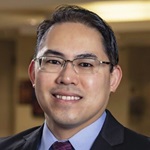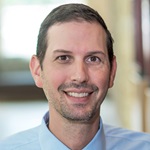Timothy’s Story: Voicing Praises After Head And Neck Cancer
“I was growing tumors in my throat and my neck, and I could not breathe. What was happening was, every week that went by, I could breathe less and less,” recalls Timothy Boatright.
“After a year of it just progressing and getting worse and worse and worse, I went to Dr. (Sameep) Kadakia's office, and he scoped me and noticed that I needed a tracheostomy immediately.” A tracheostomy is a surgery to place a breathing tube through the neck and into the windpipe, or trachea.
Dr. Kadakia performed the tracheostomy and also placed a feeding tube in Tim. Besides interfering with his breathing, the cancer limited Tim’s ability to eat. This weakened him and caused him to lose 100 pounds over the six months preceding his diagnosis. These procedures, Tim says, “made my quality of life immediately better.”
But biopsies and scans revealed that Tim had stage four head and neck cancer.
Dr. Kadakia, a head and neck surgical oncologist, says, “I was concerned about the sheer size of the tumor, and given that the tumor was involving not only the voice box, but part of the back of the tongue, I was concerned about what the best option for treating Tim was going to be, that was going to work, with his beliefs and his family's desires. But also treat the tumor in a way that we could give him both quantity and quality of life back.”
‘It Was Really, Really Bad’
This was in October 2021. Tim, now 56, remembers that Dr. Kadakia, when sharing the results, “didn't want to mince words – it was really, really bad. He didn't want me to not know that up front.”
At the same time, Dr. Kadakia and other doctors on his care team have been reassuring. Dr. Kadakia, Tim says, promised “to hold my hand through the entire process and make this happen.” The doctors have kept his spirits up through the difficult days of chemo and radiation.
“When we had a presentation at what we call our Multidisciplinary Tumor Board conference,” says Dr. Kadakia, “the group was relatively divided in the sense that there were many people that felt that surgery would be the best option for Timothy. And that generally is a tried and true modality.
“However, given the fact that Timothy was young and wanted to try to preserve his voice box as best as possible, the other option was to consider chemotherapy and radiation for him.”
Coordinating Tim’s care, Dr. Kadakia had him see medical and radiation oncologists and a speech and swallow therapist.
“My role in Timothy's care was to not only establish the diagnosis, but build the relationship with his family and help coordinate a lot of the care going forward,” Dr. Kadakia says. “My team's role in his care was to help navigate him through this process. And after the treatment was completed, also follow up closely with him to get him to a point where he was able to survive very safely without a feeding tube and without a tracheostomy.”
‘I Can Save You’
“His exact words were, ‘I can save you,’” Tim recalls. “Those were his exact words.”
“But it's (the treatment process) going to suck,” Tim’s wife, Patsy adds. “And you're going to want to quit.”
Tim says, “The care that they provided for me as I was going through the radiation and the chemo was, I mean, nothing short of just amazing, because they kept me coming, because I was going to quit every day.
“The challenges that I encountered and had to overcome, one was fear. I was terrified.” Tim adds that Dr. Kadakia; his medical oncologist, Joseph See, MD; and his radiation oncologist, Guy Savir, MD, were aware of his fear. And knew what to say to keep him going through therapy.
“That's what they were doing for me that entire time, is making sure I was upbeat, happy, positive.”
Family Support
Dr. Kadakia adds that Tim was also getting uplifting support from his family. “I think the greatest supportive care comes from his family first and foremost. When patients have challenging diagnoses like cancer, and the cancer journey that looms over their head, having a supportive family is probably the number one most important resource that the patient has.”
Speaking of his wife, Patsy, and sister’s attentive support, Tim says, “I would have never in my life thought it was possible for two human beings to love you that much. They're making sure I'm doing everything I have to and just making sure that everything is exactly the way it needs to be.”
Other support came from home health care provided by Fidelity Health Care and therapists in Premier Health’s dedicated head and neck oncology swallowing program. Dr. Kadakia says, “Our therapists work very closely with Timothy and his family to not only get Timothy the best speech outcomes, but also the best swallowing outcomes.”
Beyond Expectations
The outcomes even exceeded expectations. As Patsy explains, “We didn't expect him to be able to talk after all the radiation.” That it would damage his vocal cords. Then Dr. Kadakia asked if his medical students could come in to see Timothy. “They have to see this,” he told Tim and Patsy.
Patsy remembers Dr. Kadakia saying to Tim, “Your vocal cords are perfect, and what a miracle.” Patsy adds with a smile, “Because Tim likes to talk.”
After completing treatment, says Dr. Kadakia, “Timothy has been cancer free. All of his imaging, meaning all of the PET scans that he's gotten, all the CAT scans, they're all very, very reassuring, showing that the cancer that previously was found is no longer evident on those scans.”
He adds, “As far as quality of life is concerned, Timothy currently has no tracheostomy, meaning that he is back to breathing through his own mouth and nose very safely, and he doesn't have a feeding tube anymore, which means that he can enjoy all of his meals by mouth.”
Tim’s experience, Dr. Kadakia adds, illustrates the significant relationship of a health care provider, the full medical team, and a patient's family. “What's really important is that partnership that we gained by having an open, honest communication and by empathizing with a patient and their family.”
Tim concludes, “I want Dr. K. to know how much I love him. I want Dr. See to know it. I want Dr. Savir to know it. I want the nurses to know.
“I just love what has happened to me in the last three years, ironically. Yeah, it doesn't make sense. But I love them. They brought me back to life.”
“They did,” Patsy adds.
Contact Us
Call the Premier Health cancer hotline at (844) 316-HOPE(844) 316-4673 (4673), Monday through Friday, 8 a.m. to 5 p.m., for more information.





